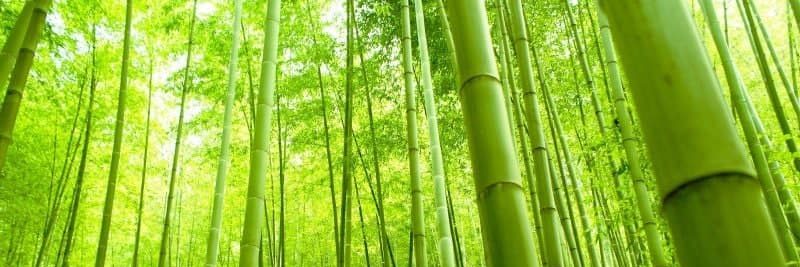So we started off with wood for our tools and made many things with it. We chose the trees that are strong and durable. That was good for awhile. Then we dried them, treated & processed them and made them last longer. Along the way, we also used stone. Oh, stone is so much harder and last longer. But it was not as malleable as wood. So we used both for a long time, complementing each other.
We then discovered smithing and started using copper, tin, bronze, iron and many others. Along the way, we developed and learnt how to make them stronger and more durable. With each innovation, we found a way to prevent them from rusting, from breaking down.
Beyond wood, stone and metal, we also used glass and clay. Unlike wood, glass and clay can be molded into various shapes needed. Strong and yet lighter than metal, it was great. But they were brittle. Very brittle. Modern tempered glass can be made stronger, but then it is heavy.
Then we invented a magical material.
It was malleable and yet hard. If you needed, soft variants can be made. You can make it into thin strands like cotton thread, or have them shaped into bigger stronger structures if needed. And it was durable. It would not decay or rot like wood, nor rust like metal. It was water resistant and can have high heat tolerance if needed. You can even shape it the way you want it. Exactly. Precisely. It was the perfect, magical material.
We invented plastic.
Now we have the ideal material that allowed us to do whatever we want. Perfect ideal material. Magical. Only problem: We are too successful in our pursuit. Most plastics will outlast several generations of human beings.
Some people say that we should bring our own bags when we go to the market or mall. I agree. But I think many Singaporeans reuse that *ntuc* plastic bag as trash bag. If we bring our own bags, we will end up buying trash bags, which we are presently not buying.
The problem is that we cannot see across time and space. We can only see what is near, so it is hard to visualise how the whole earth is changing because of our habits. We also cannot see these changes to our environment because we do not have the patience, energy or ability to watch over a span of several months or years. And even if we could, we mostly lack the ability to see the patterns within what we observe.
We are unable to link our habits (cause) with the environment harm (results).
The same goes for the Law of Karma. Untrained, it is not easy for us to see directly the functioning of karma. But if we train our mind to be more observant, calm and mindful, we can start to see the patterns emerging. Patterns of wholesome actions
leading to happiness, peace and calm, and patterns of unwholesome actions leading to sorrow, lamentation, pain, distress and despair.
To observe the long term effects of our actions on the environment, scientists take sample data from various environment metrics to develop a model. Through this model, they can approximate and project the possible impact of our actions before it occurs. So far, the picture is not a pretty one. We are going into our 59th minute or 11th hour. Our time is running out.
The world as a whole need to rethink how we use the earth’s resources. It is not an finite source unlike the US dollar (or other currency) which the US treasury can simply print more green back and flood the market with it. If a certain natural resource run low or run out, we cannot simply produce more of it. Natural resources cannot be manufactured so to speak. It can only be replenished over time as nature take its course. A broken wooden chair when left to the element, decay and rot over time. Its constituent parts, be it the four elements or its hydrocarbon molecules, break down as it interacts with the environment. Over time, a chair that is untreated will totally disintegrate and so call ‘disappear’; the ‘chair’ disappeared’ but the elements move on in this earth, is absorbed or combine with other entities. This process of decay and decomposition do not speed up just because scientific advances allowed us to speed up the manufacturing process.
Scientists are also trying to speed up the decomposition by tweaking certain bacteria to act on certain ‘protein’ in plastic, and a teen managed to do just that. “The Waterloo, Ontario high school junior figured that something must make plastic degrade, even if it does take millennia, and that something was probably bacteria.”
It all boils down to control. We want changes that suit us. But nature has other plans. This very physical world has other plans. It will change, not according to our whims and fancy. It will change only according to conditions. In a simplistic sense, science is really about understanding this world so that we can steer how it changes in order to satisfy our needs and wants. When we want it not to change, we paint it, lacquer it, glaze it, electroplate it, wrap it with vinyl, enshrine it in glass or make it chemically inert. If we want it to change, we heat it up, toss it around, dissolve it, charge it, or even send our bacterial minions to do our bidding.
Scientists in some ways are like the Buddha. They try to know and understand this world to make our life easier, better, without so much stress and suffering. Difference is that the Buddha discovered that the nature of this world is that it is impermanent, subject to change and cannot be controlled by any single entity, but goes in a constant flux of transitions according to conditions. Instead of changing the world, the Buddha realised that we have to change ourselves. By reducing our craving and attachment, our suffering reduces, by realising the true nature of all phenomena, one’s habit of delighting, craving and attachment / control subsides and ceases. With that, suffering also ceases.
Scientists instead went the other way to change the world.
As I type on this keyboard, made mainly of plastic, I wonder how we can balance between changing the world and changing ourselves. Each of us have to find that balance that work for us at this moment. I just hope we find that balance sooner.
So, which part of “All conditioned phenomena are subject to change” do we not understand?
References


